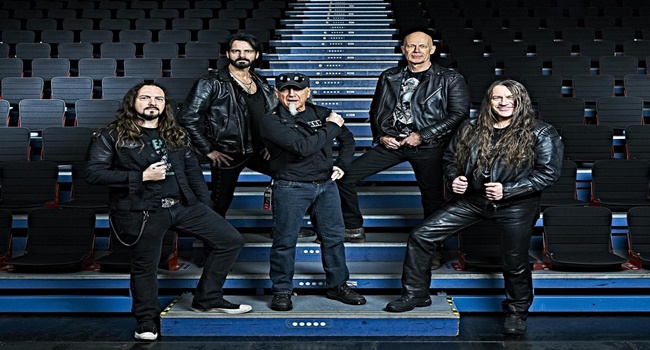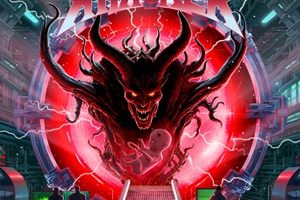Accept – Musical Outlaws
Sunday, 21st April 2024
Photo: Christoph Vohler
When it comes to classic, traditional heavy metal, a staple in any discography has to be Accept. Beyond the benchmark albums (Breaker, Restless and Wild, Balls to the Wall, Metal Heart) they’ve released a series of worthwhile records since returning to the scene starting with Blood of the Nations in 2010 all the way through to their latest effort Humanoid. Between tasty power riffs, strong rhythm section propulsion, and the unique grit of vocalist Mark Tornillo, you can always count on a consistent level of quality songwriting and performances that will leave you pleased, satisfied, and throwing the fists up for more.
We reached out to guitarist Wolf Hoffmann once again in the middle of a power packed interview schedule to discuss the making of Humanoid, the AI discussion behind some of the lyrical themes, memories on specific songs for the new album, his thoughts on the US/European live markets and how festivals have changed the game for appeal, misconceptions overcome about heavy metal through the years, decision making and his thoughts on regrets, plus what we can expect as far as more solo records and touring for Accept.
Dead Rhetoric: Humanoid is the 17th studio album for Accept – how do you see this set of material sitting in the discography of the band, were there any surprises or challenges that took place during the writing or recording process this time around?
Wolf Hoffmann: No, no real challenges. The last album was a bit challenging because it happened during COVID times. This album luckily was quite relaxed and normal, I would say. We all got together and recorded everything in a matter of a few weeks. We recorded in Nashville, Tennessee, Andy Sneap came over from England and we did things pretty much like we have over the last few albums. No huge difficulties or whatever.
The secret is having the songs in good shape before we start the recording. Once the song is pretty much finished and you know what you are going for, that’s most of the battle. When you are in the studio and you are fishing for ideas or you run out of juice basically, you have no ideas then it gets difficult. If the ideas are all there, and the blueprints for the songs are all there, then it’s just a matter of getting a good take and the best performance down.
Dead Rhetoric: Do you know early on during the demo stage which songs congeal the most to make the final cut? Are there certain aspects that stick out to you more because you’ve been doing this for so long?
Hoffmann: You would think so, but not really. Again, I had a bunch of ideas – 40-50 half finished songs and rough ideas, took all that with Andy, played it to him, and asked for his guidance. The others contributed some song ideas too. Out of that pool of songs we started chipping away at the first few songs. After a couple of weeks, we had a bunch of songs in rough shape, took those home and finished them, created some new parts and some solo sections. By the time we started recording, 90% of the stuff was demoed so we knew what we were going for. Sometimes while they are doing vocals I still come up with parts, but for the most part we like to have everything laid out before we start recording. It’s not good if you are in the studio and you are there to record, not really to write, at least in my mind.
Dead Rhetoric: What’s the process like working with Andy Sneap now that he has been a part of this process for years?
Hoffmann: It feels very comfortable. Like having an old pair of comfortable sneakers. We’ve known each other for so long, we know each other really well. We know each other’s temperaments, Andy and I work quite well together, I must say.
Dead Rhetoric: Although not a concept record, there are many themes related to AI and the reliance of technology stripping away individuality for humanity discussed through the lyrics. What is your stance on AI and it’s development – do you worry that these tools can be beneficial in the hands of some but painful or harmful in the hands of others, depending on their use?
Hoffmann: Yeah, probably. I was a little worried, but I’m not afraid. We will have to figure out how modern technology and AI’s a little concerning. We are getting into the territories of art, me being an artist and speaking for a lot of other musicians everyone is thinking, is this going to replace us completely? I have a hard time believing that. I think it will take some work. It’s an interesting observation. Anytime anything goes digital, it loses it’s value. We saw it in recording studios, photography, music. When Napster came and MP3’s happened, the value of recorded music kind of dropped. Now that AI is taking over certain creative parts – journalists, then you wonder if it will lose it’s value even more? I hope not, time will tell.
Dead Rhetoric: As a journalist, I don’t want AI taking over so much that it loses the creative process from human being and human mind use when it comes to art. I think people can usually tell the difference when something is computer generated versus when something is derived from humans…
Hoffmann: Yeah, until now. But how will it be in ten years, my man? That’s the big question. We might not like it, but can we change it? Nope. Once the genie is out of the bottle, it’s too late. You can’t stop progress. If the technology is there, then you can’t undo it. It’s going to find it’s way into our lives whether we want it to or not.
Dead Rhetoric: I’d like to delve into some of your thoughts on a few of my favorite tracks for Humanoid – namely “Frankenstein”, “Ravages of Time” and the closer “Southside of Hell” – what can you tell us about the development and ideas behind these songs?
Hoffmann: “Frankenstein” was one of Uwe’s ideas. I went to his place, worked on a bunch of songs and this was one of them. I found it musically very interesting, and he had the idea of Frankenstein and the chorus, and I didn’t know what to think of it. In the end it made the cut, luckily Mark wrote some great lyrics to it. He was approaching it from the standpoint of looking at the world from the viewpoint of the monster itself, he doesn’t think of himself as a monster, he just wakes up one day on this guy’s operating table and he hasn’t done anything wrong, yet people are freaking out. I thought that was an interesting angle. “Ravages of Time” started with my little guitar melody, it was a simple thing I had written. Maybe we can turn it into a slow song, on the last album we had “The Best Is Yet to Come”, I thought it might be another song from Mark where he can really put his soul into the vocals. Nice, melancholy thought – I’ve been doing this since I was 16 years old, here I am all these years later, clearly not 16 any more but I still feel like I’m 16, even if I don’t look like I’m 16 when I look in the mirror. Those are the life reflection thoughts I had when I came up with the idea for that song.
“Southside of Hell” – that was a bit of musical fun that I had, writing a bunch of riffs and not really knowing or caring where it would lead me. Sometimes I do that when I pretend I’m not even writing a song, I’m having a bit of fun. I didn’t really know if it would make the cut, when I played it to Andy, he was all cool about it. Let’s go with it, initially I thought is it anything that’s usable? Sometimes those things, if you don’t think about it too much, those are the things that people really like. It’s not the typical laid out song, verse/chorus, it’s just a bunch of stuff that sounds like fun.
Dead Rhetoric: You shot videos for the title track and “The Reckoning” – what were these shoots like, and how do you feel about the art of the visual medium today versus the importance of music videos back in the era of bigger budgets and MTV airplay?
Hoffmann: Excellent question. We went to Poland to shoot (the videos) there, we worked with a Polish company, we had worked with them before on the last album for the video with “The Undertaker”. We basically, they made a pitch for it, we tweaked it, and we really liked it. We played in front of a huge video wall with a bunch of related images – we told them we wanted it to look like Metropolis, that movie. This is the some of the inspiration we wanted, and of course they did it in their own version. I thought the approach was really cool to shoot that video. We shot another one for “The Reckoning” on the same day, or the next day. At the same place, it was a live performance video with flames. That was also a lot of fun.
In general, I have to say I like videos now better than in the past. I remember shooting videos with crazy budgets in the 80s – “Balls to the Wall” that was on film, and it was completely different. Compared to nowadays, smaller cameras, everything is easier to edit, you can see stuff right away after you’ve shot it. Back in the film days you couldn’t see anything, you had to wait until it was developed and edited properly by hand. I enjoy it more nowadays.
Dead Rhetoric: After being a part of the Nuclear Blast roster since 2010, this record finds you aligning with Napalm Records. Where do you assess their commitment, knowledge, and promotional abilities to keep Accept front and center in all parts of the world through their business practices and work ethic?
Hoffmann: Some big words there… they have great work ethic. They seem to be a dedicated, smaller label that is ambitious, a perfect fit for where we are and what we needed. Nuclear Blast was sold to a big corporation and things had really changed there, Napalm stepped in at the right time when our contract was up and made us a great offer, so here we are. They seem to be as ambitious and dedicated as Nuclear Blast were in the beginning, before they sold. I don’t want to knock Nuclear Blast- they worked great for us, but everything changed when they sold (their label) to a big corporation.
Dead Rhetoric: The touring market in the United States for rock/metal acts can be especially difficult to be a profitable venture for bands these days compared to Europe, Latin/South America, and the Far East to name a few examples. What do you see as the biggest factors at play to make the USA a strong market once again as it was in the 80s and 90s? Do you believe the fanbase is there, it’s just a struggle to get major media involvement to increase awareness?
Hoffmann: Yeah, I know the comment that Mark made recently… I think he went overboard a little bit. I wouldn’t say that metal is really dead or anything, there are still a lot of fans that would love to see more metal bands. The reality is people don’t go out to see shows as much as they used to. It’s maybe a matter of building up the market again. I think the fans are there, we need to connect with them a little more. It’s also a fact that in the 80s, everyone from all over the world wanted to tour the US, because it was the land of milk and honey for a while. And then, something happened, and now a lot of American acts tour more in Europe, that’s their main market now. It completely shifted, which is funny. I think there is still a lot of potential in the US market for us, and for metal.
Dead Rhetoric: I think so as well – the appeal is into a second and third generation of fans. Metal has been alive for 50 years…
Hoffmann: It’s definitely not dead, and never really went away. I think we need to go out there and show the fans that we are still around, and once they see it. We played the Monsters of Rock cruise recently and people went crazy, we have played the M3 Festival a few years ago and people loved it. I know the potential is there.
Dead Rhetoric: Do you believe the festival market could rebuild things in the US – especially how things are in other parts of the world where a festival like Wacken started at a few hundred attendees and now attracts 75,000 every year?
Hoffmann: Yeah, the festivals that’s what started this whole (resurgence) in Europe. Because in America, I have the feeling – because I live in Nashville, Tennessee, I didn’t have a good sense of how metal was still alive and vibrant in Germany until we started playing those big festivals again. You have to give credit to a lot of these Wacken-type festivals, they’ve really built it up. It’s now dead and center in the mainstream in Europe, you see multi-generational families going every year, using it as a family vacation, they camp out there and enjoy it. You now have Hellfest, Sweden Rock, major festivals – I wish there was more and more stuff like that here in the United States, big festivals with 20,000-40,000 people. You have to build it up, they all started smaller and built it up over time.
Dead Rhetoric: What do you think are some common misconceptions about heavy metal that have been demystified or contradicted from your start within playing this style to where the genre is at now?
Hoffmann: (laughs). I remember when we started there was a bit of a rebellion against society, having long hair and leather jackets. We wanted to be outlaws, musical outlaws, and we definitely didn’t want to fit in anywhere, that was clear. Man, it has shifted so much – especially over in Europe. Whole families go to shows – which was unthinkable in my day growing up in the 70s and 80s. The idea that I would have gone to a show with my father would have been…no, no chance in hell. If our parents hated the music that we did, two thumbs up. Now it’s clearly in the mainstream, people love metal for what it is. I think they got to know that not all of this is meant to be dead serious. At first glance, it’s aggressive, we talk about the devil, hell, and all this (negative) stuff, but from my experience, hardly anybody takes it for face value. There may be some freaky bands out there that say they are going to talk to the devil, but it’s a bit of tongue in cheek, isn’t it? Once you understand that, this ends up losing a little bit of fear that parents initially had.
Dead Rhetoric: When looking at your life, what are some of the choices you’ve made that make you who you are as a person?
Hoffmann: That’s a deep question. I guess anything that you do makes you into who you are. There is also the theory that a career, or being a live musician, is just a series of decisions, going left or right, yes or no. At the end of the day, there’s a lot of luck involved if it turns out alright, also sometimes its about making the right decisions. You are always going to make some decision that will turn out bad – hopefully you learn from those. One thing I could say, I’ve never regretted much in my life, because when you make a decision and at the time it seems to be the right one, you go with it. And five months later or five years later, you find out it didn’t turn out so well, to question everything is the wrong approach for me. You put it off as life experience and move on, so you learn from it. You can’t go through life being afraid of bad decisions or wrong decisions, there is no wrong or right. It’s all a part of who you are, I think.
Dead Rhetoric: Where do you think the biggest advancements in terms of technology, health care, resources, or daily life may occur over the rest of this decade that would be beneficial to the most humans?
Hoffmann: Oh my god! Who am I? Gandhi…I don’t know. Technology will influence us more and more. Of course, with the AI stuff, we’ll see how that all plays out. Technology in general has helped us out tremendously. There are people that still say they wish things were back in the analog days, but man – trying to find your way through Tokyo with an iPhone versus a fold out city map in a different language, come on, man! I think technology has certain advantages that you don’t want to be without anymore. Being at an airport to call home, making an airline reservation on your phone, all these things that we take for granted but still bitch about, there is a lot of good stuff that has happened recently through digital technology that we wouldn’t want to miss anymore. GPS is one – it’s wonderful to type in the address in my car and follow this to get me to where I want to go without even thinking, thank you! Stopping some lady on the street in the past, asking for directions, she leads you all wrong. Nowadays, thank you – GPS is worth it, all along. Just what we are doing right now (the interview) – we can see each other in real time, we are in two different places. I think that’s pretty cool – I don’t think that would happen in an analog way.
Dead Rhetoric: What’s on the agenda for all things related to Accept or another Wolf Hoffmann solo record over the next year or so?
Hoffmann: I’d love to make another album, but man it takes a long time. I need a free head to do it, and a free schedule. It’s not something you do while you are traveling, or in a hotel room. You need some dedicated time to do this. Accept is my priority, my bread and butter, and this is what I focus on the most. Everything else has to happen on the side. We will be busy – a touring schedule right up to Christmas and then we are talking already about next year. It’s going to be exciting.




























